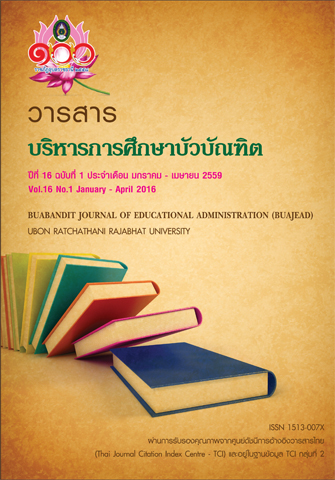การพัฒนาตัวบ่งชี้การบริหารจัดการที่ดีตามภารกิจหลักของมหาวิทยาลัยของรัฐในภาคใต้
Main Article Content
บทคัดย่อ
ผลการวิจัย พบว่า
1. ผลการสร้างตัวบ่งชี้การบริหารจัดการที่ดีนำไปใช้ดำเนินการตามภารกิจหลักของมหาวิทยาลัย ปรากฏว่าการนำหลักนิติธรรมหลักคุณธรรมหลักความโปร่งใส่หลักการมีส่วนร่วมหลักความรับผิดชอบหลัก ความคุ้มค่าไปใช้ในภารกิจการด้านการเรียนการสอนและผลิตบัณฑิตมี 20 ตัวบ่งชี้ด้านการวิจัยมี 15 ตัวบ่งชี้ ด้านบริการวิชาการมี 10 ตัวบ่งชี้และด้านทำนุบำรุงศิลปวัฒนธรรมมี 5 ตัวบ่งชี้ตามลำดับ
2. ผลการตรวจสอบคุณภาพตัวบ่งชี้ของการบริหารจัดการที่ดีเพื่อนำมาใช้ พบว่า ตัวบ่งชี้ ที่สร้างขึ้นมีความเหมาะสมในการนำมาใช้บริหารจัดการตามภารกิจหลักของมหาวิทยาลัย ในระดับสูงทุกด้าน มีค่าความเชื่อถือได้ในระดับสูงมาก และเมื่อวิเคราะห์องค์ประกอบของตัวบ่งชี้ปรากฏว่า สามารถใช้ได้ตามเกณฑ์ 10 องค์ประกอบ
3. ผลการวิเคราะห์ตัวบ่งชี้ของการบริหารจัดการที่ดี พบว่า สามารถนำมาใช้ได้ 48 ตัวบ่งชี้ โดยแบ่งกลุ่มองค์ประกอบได้ทั้งหมด 10 องค์ประกอบ โดยแต่ละองค์ประกอบมีตัวบ่งชี้ เรียงตามลำดับ คือ 9 ตัวบ่งชี้ 6 ตัวบ่งชี้ 7 ตัวบ่งชี้ 6 ตัวบ่งชี้ 3 ตัวบ่งชี้ 4 ตัวบ่งชี้ 3 ตัวบ่งชี้ 4 ตัวบ่งชี้ 3 ตัวบ่งชี้ และ 3 ตัวบ่งชี้ ตามลำดับ
A Development of Good Governance Indicators for the Core Mission of Universities in the South
The objective of this research were to create, quality monitoring and analysis the indicators of good governance as a core mission of the universities in the South. The 81 samples consisted of administrators, academic lecturers and students from 10 universities in south of Thailand. Samples selected by simple random sampling method. The instruments were questionnaires with the reliability of. 968, statistics for data analyzed were percentage, mean, standard deviation and exploratory factor analysis (EFA).
The research findings were as follows:
1. The creation of the indicators of good governance were carry out for the core mission of the universities found that the principle of rule of law, morality, transparency, participation, responsiveness and effectiveness. The creations of the indicators to use as a core mission of the universities are 1) learning, teaching and producing graduates have 20 indicators. 2) developing research has 15 indicators. 3) academic services have 10 indicators and 4) integration of local and universal wisdom has 5 indicators respectively.
2. The quality monitoring of all indicators are suitable and in a very high level of reliability. When analyzed the indicators factor found the available of 10 factors.
3. The analyzed result indicators found that can be used 48 indicators. When grouping by the available of 10 factors found the sequence in order is 9 , 6 , 7 ,6 , 3 , 4 , 3 , 4 , 3 and 3 indicator respectively.

